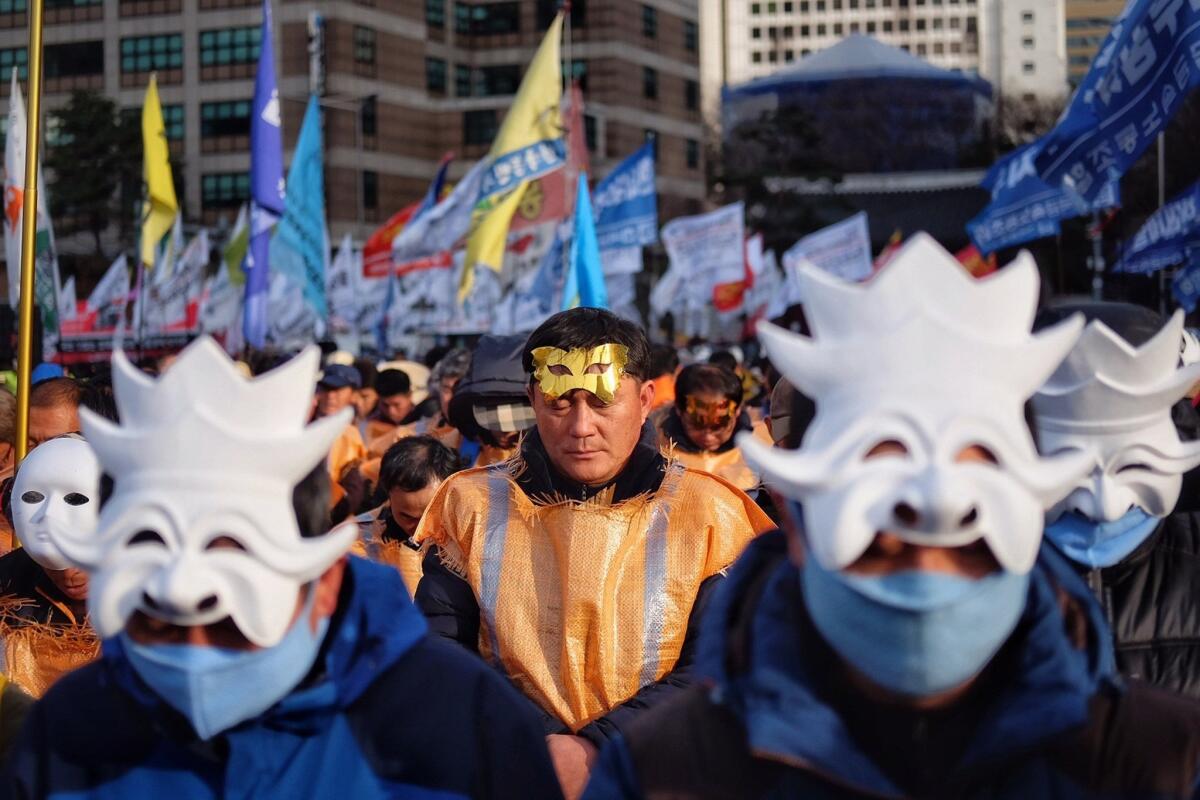South Korea protesters don masks in multipronged rally

Protesters wearing masks take part in an anti-government rally in Seoul on Saturday.
- Share via
Reporting from Seoul — They came wearing a range of masks: The Incredible Hulk, Guy Fawkes, Transformers.
Thousands of people, many of them clad in masks typically seen on Halloween, marched in an omnibus anti-government protest on the streets of Seoul, the South Korean capital, on Saturday.
The masks were a playful response to remarks last month by South Korean President Park Geun-hye, who after an anti-government gathering in the same location called for legislation that would make it illegal for protesters to cover their faces. In that Nov. 14 demonstration, protesters wore face coverings as they clashed violently with police. Park also said that legislation was needed because terrorists could cover their faces and blend in at protests. Moreover, she noted, Islamic State members often cover their faces.
Saturday’s protests had a much more peaceful tenor than the Nov. 14 gatherings. Protesters on issues ranging from history textbooks to rice imports marched unimpeded past police, and no violence was reported. At the previous gathering, protesters lashed out when police set up vehicle and human barricades blocking their movement.
At both gatherings, protesters spoke out on a litany of issues. Students and educators decried the government’s plans to issue a single history textbook for all middle and high school students. The groups carried placards reading, “Accurate history means not having only one take on history.”
Critics have alleged that the policy is an attempt by the government to whitewash South Korea’s history of dictatorship, while the government has said that having one textbook will help ease ideological divisions.
Police estimated that around 14,000 protesters attended the gathering Saturday, compared with 60,000 at the one on Nov. 14.
Police had sought to ban the event Saturday, but on Thursday a court ruled it could take place, saying it was in line with freedom of assembly provisions in South Korea’s constitution.
The protests’ main organizers were labor unions virulently opposed to revisions of the country’s labor laws they believe would make it easier for companies to hire and fire workers. Unions claim that the proposed changes would lead to additional unemployment and inequality.
Farmers calling on the government to ban imports of rice arrived by bus, draping themselves in rice bags, with messages reading, “No rice imports.”
“We came a long way to be here,” said Jung Min-kyu, 58, a farmer from Jeolla province in the country’s south. “We thought this was the only way to make our voices heard.”
Saturday’s march started at a square outside Seoul City Hall and ended at Seoul National University Hospital, where Baek Nam-gi, 69, lies in a coma. The farmer was injured during the Nov. 14 rally when he fell and hit his head after being struck by a stream of water from a police water cannon.
The political opposition says Baek’s story is emblematic of an excessively harsh government response to the Nov. 14 rally. On Saturday, protesters chanted messages of hope for Baek’s recovery and urged Park to apologize.
Cho Hyung-hoon and three friends attended from Sungkyunkwan University in Seoul, where they are seniors. The four young men, who donned Guy Fawkes masks, said they were concerned about the state of the nation as they prepare to graduate and enter the job market.
“The government has been pushing ahead with their policies without building a consensus,” Cho said. “I think some people are losing faith [in the government].”
More to Read
Sign up for Essential California
The most important California stories and recommendations in your inbox every morning.
You may occasionally receive promotional content from the Los Angeles Times.













